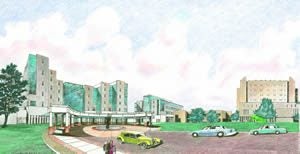Cardiovascular institute planned for eastern N.C.
East Carolina University and University Health Systems of Eastern Carolina have announced plans for a major initiative to fight cardiovascular disease, the leading killer of North Carolinians and an especially tenacious foe in eastern North Carolina.
Led by ECU’s Division of Health Sciences and Pitt County Memorial Hospital, the organizations plan to build a heart hospital and an adjacent center for cardiovascular education, research and outpatient care on the health sciences campus in Greenville.

This artist’s rendering shows what a proposed cardiovascular institute in Greenville may look like. Photo by Cliff Hollis
These facilities, the planning for which would begin in 2004, will be called the North Carolina Cardiovascular Diseases Institute and will be headed by renowned heart surgeon W. Randolph Chitwood Jr. The institute is expected to be a statewide and a national resource because of the reputation of ECU’s existing cardiovascular program.
“Heart disease is, unfortunately, something in which our region is a national leader,” said ECU Chancellor WilliamV. Muse. “It makes perfect sense that ECU and University Health Systems should take the lead in addressing this devastating problem for our region. Our partnership, which is unique in North Carolina, has the talent and the will to get this job done.”
Dave McRae, chief executive officer of UHS, said the new institute will connect cardiovascular services throughout the region in a way that will serve as a model for other medical services as well as predominantly rural areas.
“This institute will be an important step in fulfilling our basic mission to improve the health of all of the residents of eastern North Carolina,” he said. “We will do that by not only creating this resource in Greenville, but by linking with and supporting the work of hospitals and physicians involved in a daily battle with this disease in our region.”
The institute will include the following:
–A multi-story, 150-bed cardiovascular hospital, including dedicated operating rooms, cardiac intensive care and intermediate units, state-of-the-art diagnostic and treatment laboratories and support services. Total cost of the hospital, which will be built in phases on a site between PCMH and the medical school, is expected to be between $50 and $100 million. The plans are subject to approval by the N.C. Department of Facilities Services.
–An adjacent building where doctors and other health care professionals will conduct patient appointments, conduct educational activities and clinical research, and oversee sophisticated data and communications systems that will create a virtual network among heart specialists across eastern North Carolina. Estimated cost of the facility is $50 million.
–An addition to the medical school’s Warren Life Sciences Building dedicated to basic research on cardiovascular disease, with an estimated cost of $10 million.
UHS expects to fund the construction of the heart hospital with bond debt. ECU hopes to receive support from the General Assembly in funding its portion of the institute.
Chitwood, who will become director of the center July 1 pending final action by the ECU board of trustees, is best known for his pioneering work with heart valve and robotic heart surgery, which has brought international acclaim to ECU and PCMH.
His vision for the institute, mapped out in a detailed strategic plan last year, concentrates all the specialists involved in the care of heart and vascular patients — university and private practice cardiologists, cardiothoracic and vascular surgeons, radiologists, pediatric heart specialists, nurses and therapists — into a single entity focused on heart and blood vessel disease and congenital heart disease. This approach identifies patients earlier, when their conditions are usually more treatable, and avoids the delays, disconnects and redundant testing that occur when medical providers work in relative isolation from each other.